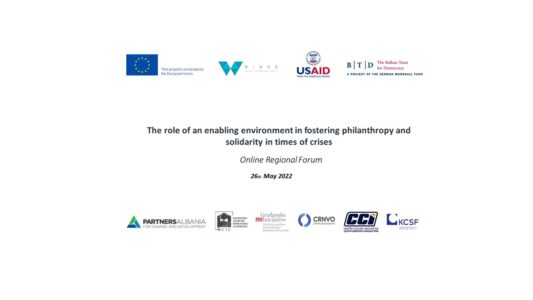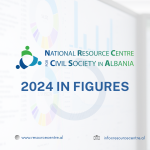Access to information is a human right, is the message of the Regional Online Forum “Human Rights and Access to Information”, held on July 14, which gathered dozens of participants from the countries of the Western Balkans – representatives of civil society, institutions, private sector, donors, academic community, and media – through three panel discussions.
This was the sixth forum in a row within a series of regional forums that gather participants from Serbia, Bosnia and Herzegovina, Albania, Kosovo, North Macedonia, and Montenegro. The focus of this edition was on the importance of the role of human rights and access to information during the pandemic, emphasizing the legal aspects of enabling such activity, as well as the exchange of best practices of CSO solidarity related to this topic.
The forum was organized by Civic Initiatives, in partnership with organizations from the region: Macedonian Center for International Cooperation (MCIC), the Center for the Development of Non-Governmental Organizations from Montenegro, the Kosovar Civil Society Foundation (KCSF), Partners Albania and the Center for Civil Initiatives from BiH, with the support of the Balkan Fund for democracy, a project of the German Marshall Fund of the USA and USAID.
Bojana Selaković (Civil Initiatives) and Ariola Agolli (Partners of Albania for Change and Development) welcomed the participants of the Forum, and then three panel discussions were held.
In the first panel “Human rights during and after the COVID-19 pandemic”, regional, European and global perspectives in this area were discussed by Leo Pura (CSO Partnership for Development Effectiveness CPDE), Orsolya Reich (Civil Liberties Union for Europe) and Simona Mladenovska (Balkan Civil Society Development Network).
The current situation regarding the right to access information, from different perspectives – from CSOs dealing with transparency issues, to independent institutions and journalists, was discussed in the second panel, Access to information as a human right: Pandemic perspective, where Nada Maričić Đorđević (representative of the office of the Commissioner for Information of Public Importance), Ana Toskić Cvetinović (Partners Serbia), Rade Đurić (SafeJournalists network) and Nevena Ružić (Open Society Foundation) shared their views.
What difficulties do countries in the region face when it comes to access to information and how much does the restriction of that access affect civil society and the media, was the topic of the third panel, Restriction of information in the era of Kovid-19: the response of civil society. Natalija Jovanović (BIRN Serbia), Borka Rudić (Association of BH Journalists), Dren Gërguri (lecturer at the University of Pristina), Klejda Ngjela (CRD Albania), Bojana Laković Konatar (Trade Union of Media of Montenegro) and Biljana Nasteska Kalanoska (Association of Journalists of Macedonia) presented their experiences from their environments.
The participants of the Regional Forum agreed that during the pandemic, all countries of the Western Balkans went through almost the same difficulties – limiting access to information, which led to even greater fear among citizens, but also their distrust of institutions. It was also stated that previous experiences should serve as a lesson, and the Regional Forum as an opportunity – for organizations from the region to cooperate more in the future, to work together and achieve “synergy that was lacking in the past”.






